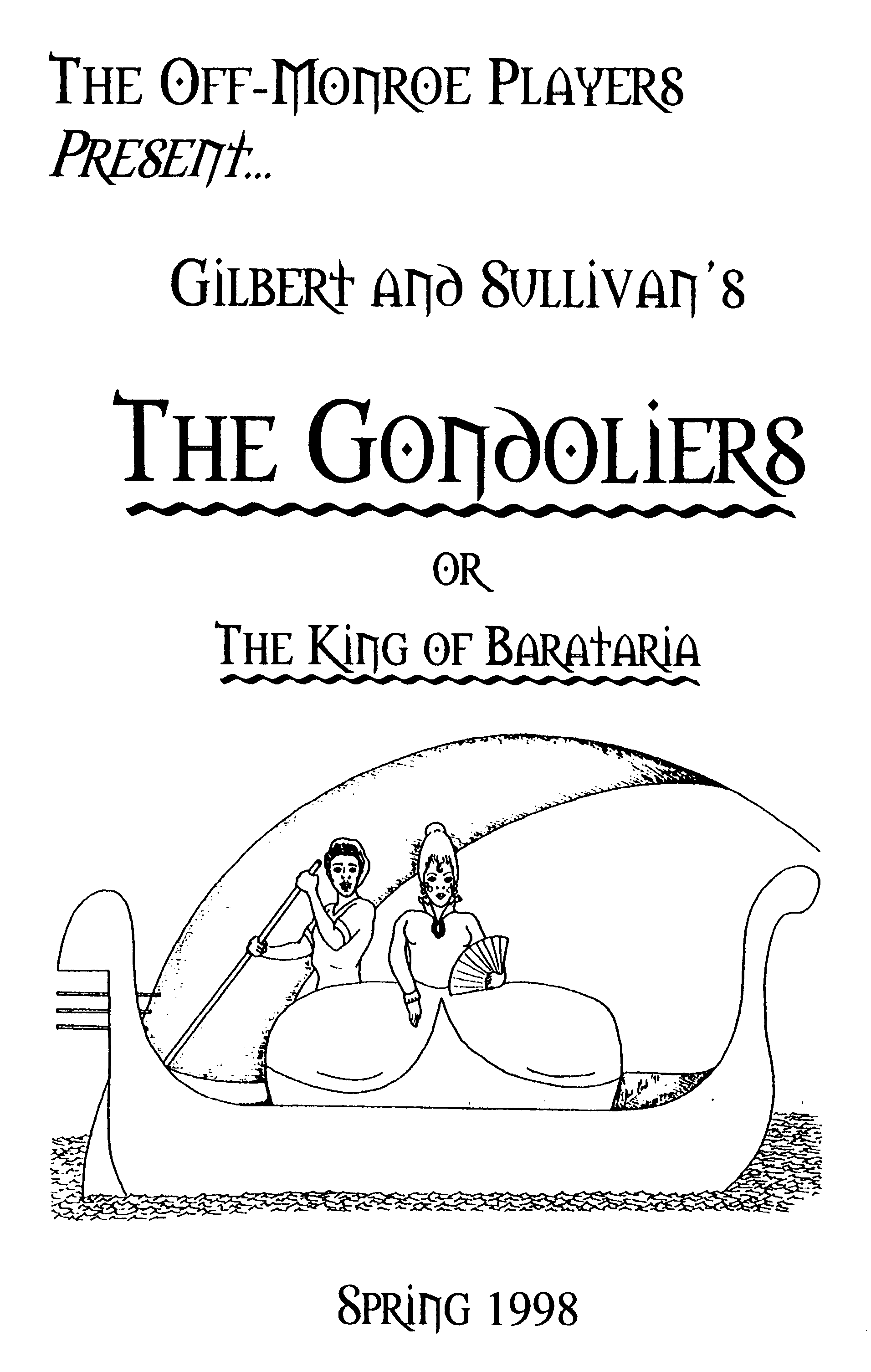Spring 1998: The Gondoliers

Notes
There are several stories about the genesis of The Gondoliers which give us insight into the opera. One is that Gilbert was so annoyed by the complaints of company members that they did not have big enough parts, and so angry at Jessie Bond who demanded a higher salary for her contributions to the success of the operas, that he declared, "I'll write an opera in which there will be no principal parts!" Rather, what he wrote is an opera in which the principal parts are nearly equal, in length and memorability. It seems appropriate, then, that the main theme of the piece is equality. Marco and Giuseppe hope to operate a monarchy on republican principals, so "all shall equal be." But this plan fails. In the world of Gilbert and Sullivan, success went to those who recognized and abided by the "natural" hierarchy of classes. To treat everyone equally was a comic idea for Gilbert; as Don Alhambra points out, "When everybody is somebody, then no one's anybody." In the end, monarchy, and therefore order and balance, are restored.
Another factor that went into the process that created The Gondoliers was Sullivan's increasing desire to write more serious works, a grand opera if possible. Sullivan had in fact requested of Gilbert that they turn their attention to more serious themes and allow the music to have more importance in their works. Gilbert had responded that Yeomen of the Guard, which was very serious, had not been well-received, and besides, he didn't want music swamping his lyrics. This issue lead to a tremendous quarrel between the two over which element — music or words — had or should have dominance in the collaboration, and the quarrel was still in progress during the writing of The Gondoliers. It is interesting to note, then, that the first twenty minutes of the show is entirely sung, as in grand opera. One theory is that this choice was Gilbert's attempt to meet Sullivan halfway in his desires. In any event, The Gondoliers is unlike any of the other operetta in this regard.
So the story was born in the midst of discord and dissatisfaction, but nevertheless, it is one of the most lighthearted and upbeat of the whole canon of G&S. The conflicts are not life-threatening, few dark elements emerge, and no one is a villain. Welcome to Venice, land of sunshine and melody, romance and high spirits! See you in Act II on the mythical isle of Barataria.
-- Jean Gordon Ryon
Director: Jean Gordon Ryon
Assistant Director: Kathy Moore
Music Director: Hugh Brodsky
Choreography: Kathy Perconti, Jennifer L. Stocks
Cast
- The Duke of Plaza Toro
- Joel Hume
- Luiz
- Brian Clickner
- Don Alhambra del Bolero
- Bill Hammond
- Marco Palmieri
- Ron Herman
- Giuseppe Palmieri
- Gerard S. Gombratto
- Antonio
- Jonathan Mobley
- Francesco
- Christopher A. Bork
- Giorgio
- Tracy Burdick
- Annibale
- Bob Weeks
- The Duchess of Plaza Toro
- Pamela Good
- Casilda
- Jeannie Hines
- Gianetta
- Kathy Perconti
- Tessa
- Sarajane Fondiller
- Fiametta
- Anne Virgil
- Vittoria
- Julia Ferreira
- Giulia
- Beth Holliday
- Inez
- Amanda Lobaugh
Chorus
Terry Badger, Terry Benedict, Rachael Bonter, Cynthia Brone, Josette Cameron, Fran Carlisi-Paxson, Lilah Crews-Pless, Peter Dunbar, Mike Fedyk, Shannon Fedyk, Nancy Galletto, Paula Gullo, Stephen Gullo, Isabele Henry, David Holliday, Jordu Kelly-Sutliff, Patti Anne Montrois, Kathy Moore, Sam Nelson, David Odgers, Tracy Paradis, Gordon V. Penniston, Jeanne-Marie Rogers, Rob Royston, Laurel Schneiderman, Debra Schulman, Kelly A. Schultes, Karin Staples, Sean Taylor, Byron Wilmot
Orchestra
Rehearsal Pianist: Robert Blake
Crew
- Props
- Bodie McCaffrey
- Set Construction
- Tracy Burdick
- Costume Manager
- Naomi Pless
- Lighting Designer
- Michele Denber